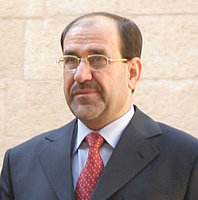Iraq's parliamentary elections this Sunday, March 7, will close the first full chapter in the country's transformation to a democratically elected, majority-rule system of government. The government elected in December 2005 consolidated Shiite rule and eventually brought Iraq a degree of security as Prime Minister Nouri al-Maliki tightened his grip on the levers of power. Now the nation's corruption, fragile peace and lack of national reconciliation have left many looking for change -- including American officials eager to see, if not a new Iraqi leader, at least a shake-up in the composition of his government.
They will likely be disappointed. There are several possible scenarios for coalitions that might emerge from the election's outcome, but only two are reasonably likely, and both would result in a government that looks a lot like the present one.
The first is that Maliki's State of Law Coalition will win a plurality in the 325-seat parliament. That would result in a government much like Maliki's government from 2008-2009, only more dominated by Maliki. A recent poll by Iraq's National Media Center (NMC) puts Maliki ahead with 29.9 percent. Iraq's constitution gives the bloc with the most seats the right to first nominate a prime minister, and even with a slim plurality, Maliki's re-election would be hard to stop.

